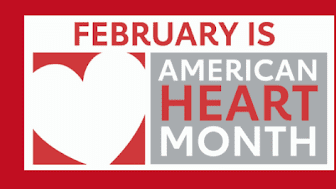February is National American Heart Month
Everyone knows Valentine’s Day is synonymous with hearts, from broken ones to paper-mache decorations. But not everyone knows February is American Heart Month. According to the CDC, Heart disease is the leading cause of death for adults in the United States. Fortunately, there are various things you can do to keep your heart healthy and happy.
Exercising regularly, getting enough sleep, and eating a healthy diet are, unsurprisingly, three major steps individuals can take to improve their cardiovascular health. Luckily, there are also smaller, more easy-to-incorporate practices adults can take to ensure their hearts are healthy.
The American Medical Association says knowing your blood pressure numbers is a significant first step towards monitoring your heart health. High blood pressure, known as hypertension, dramatically increases heart attack or stroke risk. By regularly measuring your blood pressure and knowing what the numbers mean, individuals better understand their current heart health. After knowing your heart’s current health level, you can create a plan with a medical professional to reduce or maintain your blood pressure, depending on the numbers.
Eating superfoods and cutting all processed foods from your diet will increase your heart health, and have you looking like the “after” photo. However, even simply cutting down on the amount of fats you eat in your diet provides a tremendous benefit for your heart’s health. High-fat diets clog the arteries, which restrict blood flow, leading to higher levels of blood pressure. Your arteries are less restricted by lowering your intake of fatty foods, allowing blood to circulate throughout your body more easily.
If all that sounds too complicated, lowering stress levels is another way to elevate your heart health. Stress produces cortisol, which can lead to higher levels of anxiety, weight gain, and a load of other negative effects, including (shocker) higher blood pressure. Taking a few minutes in the day to meditate or recite what you’re thankful for can lower your stress levels and help your heart stay healthy. Another proven way to reduce stress? Smile more; trust me, your heart will thank you!
It can be stressful to begin new routines or practices, especially those that are beneficial to your health. Missing a workout or blowing off a diet can produce feelings of guilt and anxiety. When these things happen, take a step back and breathe. Keeping your heart healthy is not a quick fix; it’s a lifelong journey. Find a routine that incorporates some of these best practices, but, more importantly, one that is sustainable and makes you feel happy. Happy American Heart Month!





